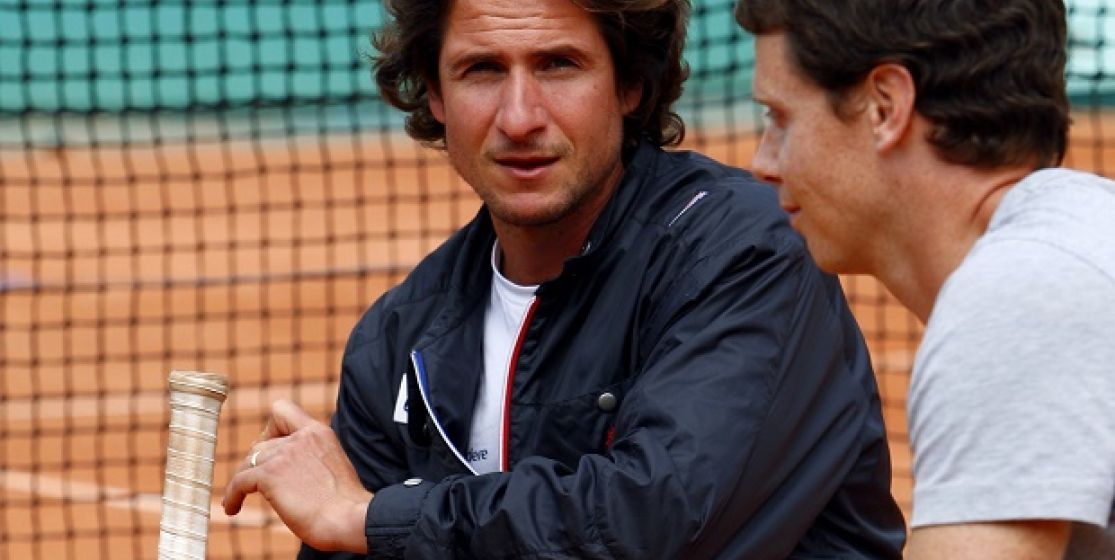Ex-coach of Richard Gasquet and the Cypriot Marcos Baghdatis, Guillaume Peyre has been using his racquets on the courts of the Middle Kingdom for more than five years. After having coached the national Chinese team between 2010 and 2012, he now coaches the province of Hubei. His goal : to finally find Li Na’s successor, the player who made tennis popular in China. Interview.
When we think of China and racket sports, badminton and ping pong come up quicker than tennis… It’s normal ! Tennis has only started developing in China from 2011, when LI Na won Roland-Garros. Before that, nobody knew about this sport here, it took time to make it popular ! I remember, when Marcos Baghdatis won the Beijing Open in 2006, tennis was only starting here. Nobody knew what it was. The organizers had to invite people to fill in the stadium but they knew absolutely nothing about it. For instance, the spectators were clapping during the warm-up…the audience was there, but it understood nothing about what was going on.
So it really was Li Na’s victory which changed everything ? Yes. The women’s doubles pair had won the bronze medal at the Beijing Olympics but people hadn’t really talked about it. Everything changed with Li Na. She became a superstar overnight. The Chinese government realized that they now had to promote tennis. Li Na was offering a great image of China and it was a good opportunity to develop this sport here.
So what is your mission in China ? I’ve settled in Wuhan, in the Hubei province. I’m the coach of every player in the province, from 12 year olds to professionals. I’ve started one year ago and my contract ends in 2017, at the end of the national Games. The goal which I have been given is to bring back at least one medal for the province. What you need to know is that in China, provinces work exactly like leagues in France. Each province is independent in the management of its players and teams. Each province capital or almost has its own olympic center where the best youngsters in the country train. They have all started like this. Speaking of which, Li Na is from Wuhan, where I coach.
What was your motivation behind coming to coach here ? The resources invested here are huge. I’m not speaking in terms of salary but infrastructures. It’s really huge. China deploys considerable human and financial resources, to be sure to get results in return. All the infrastructures, for instance, are truly excellent. In Wuhan, there is a 15 000 seats center court, another which has 10 000, and an other which holds 4000 spectators. We could almost organize a Grand Slam tournament in each province !
When will we be able to see another Chinese at the top of the game ? It’s too early to say but the future will be phenomenal. There are so many people here that talent has to be somewhere. It exists. We just need to structure how things are done in the provinces and it will work.
So they need the foreign coaches’ expertise ? Yes, and the Chinese have understood that. They started with Thomas Högstedt, the Swede who was coaching Li Na, and today, the foreigners are everywhere ! But to get results, the Chinese mainly have to understand that tennis is an individual sport. Here, whatever they do, they think « team ». But to succeed in tennis, you also have to think about yourself a lot. Li Na had understood that. The others still have to work on that.
We’ve talked a lot about Li Na and until now, women have had the better results. How do you rate the male Chinese tennis players ? They play very well but the results aren’t there. To me, it’s a question of openness. To progress, you have to play abroad, spend some time on the circuit. The girls have done it before them because they’ve had good results quicker. But today, they are on the right path. China organizes a lot of Challenger tournaments and it will automatically help the local players. They’ll face new players, progress in the ranking, and eventually they’ll have to travel more. That’s how they’ll become better and will have better results in tournaments. However, I think that the government would rather see a Chinese player win an Olympic title rather than another Grand Slam. At the Olympics, it’s China which is winning as opposed to a Grand Slam, where it’s only the player who wins…
You were mentioning the excellent infrastructures of the country. Rumor has it that China would like to organize a fifth Grand Slam tournament… I’ve heard that before, yes. If there has to be another one and that it takes place in Asia, let’s have it in China. It would be logical and it would also be a great reward. The country has been spending a lot for tennis, organizing a lot of tournaments and we can see it, Chinese people are starting to enjoy it !
It could be the Shanghai Masters ? In any case, it’s a great tournament. There as well, the infrastructures are incredible. But it comes at the end of the season, which is never too convenient for the players. There are those for which the year has been very long, and who are tired, those who are looking to grasp a spot at the Masters and who want to make the most of certain withdrawals. But the positive point remains that it’s always a great week.






